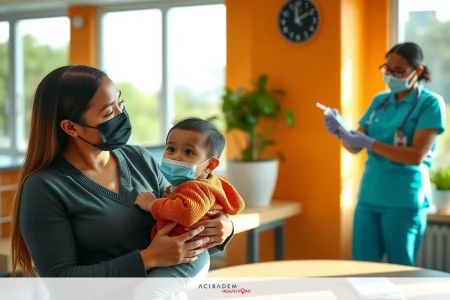Hypodontia and Infertility: Exploring the Link
Hypodontia and Infertility: Exploring the Link Recent studies show a link between dental health and fertility. Hypodontia, missing teeth from birth, is seen as a dental issue. But, research now links it to infertility, showing it affects more than just teeth.
This article looks at how dental health and fertility are connected. We use studies, dental and fertility resources. It shows how understanding hypodontia can help us see health in a new way.
We will explore how dental health and fertility are linked. This will give us new insights into health and wellbeing.
Introduction to Hypodontia and Infertility
Hypodontia is when some babies are born without some teeth. It’s a dental issue that might affect health, including how well you can have babies. We will look at how hypodontia and infertility are linked, using info from the American Dental Association and the Centers for Disease Control and Prevention (CDC).
First, let’s talk about what hypodontia is and its effects. It’s important to know how this dental issue might affect having babies. Studies are looking into how hypodontia and infertility are connected. We’ll see how treating hypodontia might help with fertility.
Studies show that genetic and developmental issues like hypodontia might affect having babies. By looking at recent studies, we can learn more about this link. This helps us understand how hypodontia affects fertility and dental health.
What is Hypodontia?
Hypodontia is a congenital dental condition. It means some teeth don’t grow. It can happen in kids or adults. Knowing about it helps us understand dental problems better.
Definition and Overview
Hypodontia is a problem that happens when teeth don’t form right. It usually means missing one to six teeth, not counting the third molars. It’s a common issue that affects how teeth look and work. That’s why seeing a dentist is important.
Prevalence of Hypodontia
How common hypodontia is can vary. The World Health Organization says it affects 3% to 10% of people worldwide. In the U.S., about 5% of people have it. Dental studies confirm this, showing we need to pay more attention to it.
Causes of Hypodontia
Understanding hypodontia means looking at both genes and the environment. We’ll explore how both play a part in this dental issue. This will help us see why some people might miss teeth.
Genetic Factors
Genes are a big part of hypodontia. Studies have found certain genes linked to it. For example, genes like MSX1, PAX9, and AXIN2 are often found in people with hypodontia.
These genes help teeth grow early on. If they don’t work right, teeth might not form well. Knowing about these genes helps doctors understand and treat hypodontia.
Environmental Influences
Things around us also affect tooth growth. Smoking, drinking, and some medicines during pregnancy can harm teeth. Being sick or not eating well during pregnancy can also raise the risk.
Many health reports talk about how to avoid these problems. This can help teeth grow right.
Associated Syndromes
Some syndromes often have hypodontia. Syndromes like Ectodermal Dysplasia, Down syndrome, and Cleft Lip and Palate often include missing teeth. Doctors have found these links in many cases.
Knowing about these links helps doctors treat people better. It makes it easier to manage hypodontia in these cases.
| Genetic Factors | Environmental Influence | Associated Syndromes |
|---|---|---|
| MSX1, PAX9 & AXIN2 mutations | Smoking, alcohol exposure | Ectodermal Dysplasia |
| Disrupted dental formation | Medications during pregnancy | Down syndrome |
| Early recognition and management | Illnesses during pregnancy | Cleft Lip and Palate |
Symptoms of Hypodontia
Identifying hypodontia is easy with clear signs. Missing teeth are a big clue. You can spot them during a dental check-up. Gaps where teeth should be show up too.
Other signs include odd teeth shapes or sizes. These can lead to bad bites or speech problems. Chewing issues are also common.
Here are some key symptoms:
- Gaps or missing spaces in the dental arch due to undeveloped or missing teeth
- Altered appearance of existing teeth (smaller size or atypical shapes)
- Complications in chewing, speech, and overall dental function
- Increased risk of periodontal disease due to spacing and alignment issues
Spotting these signs early is key. Regular dental visits help catch hypodontia early. This leads to better treatment plans.
| Symptom | Description | Potential Complications |
|---|---|---|
| Missing Teeth | Visible gaps in the dental arch | Functional and aesthetic issues |
| Altered Tooth Morphology | Smaller or misshaped teeth | Malocclusion, difficulty in chewing |
| Speech Difficulties | Impaired language articulation | Social and communication challenges |
| Increased Dental Sensitivity | Sensitivity to hot or cold foods | Pain and discomfort |
Dentists should know these signs to act fast. This helps keep teeth healthy and patients happy.
Diagnosis of Hypodontia
Diagnosing hypodontia is key for good treatment and care. It uses clinical checks, X-rays, and genetic tests. These help find missing teeth and their causes.
Clinical Examination
The first step is a detailed check-up. Dentists look for missing teeth and check the mouth for oddities. They also look at the patient’s health history for clues.
Early spotting of hypodontia in kids helps avoid problems later. It also helps plan treatments early.
Radiographic Techniques
Radiographs are crucial for spotting hypodontia. They use X-rays to see missing teeth and the bone structure. This makes sure all missing teeth are found, even if they’re not seen by the eye.
Reviews say these X-rays give a full view of the teeth. This helps in making accurate diagnoses and plans for treatment.
Genetic Testing
Genetic tests help find genes linked to hypodontia. This can confirm the diagnosis and predict other dental issues. Articles highlight how genetic tests help understand hypodontia’s causes. This leads to better care for each patient.
| Diagnostic Method | Purpose | Benefits |
|---|---|---|
| Clinical Examination | Initial assessment and anamnesis | Early detection, identification of visible abnormalities |
| Radiographic Techniques | Evaluate dental and bone structures | Comprehensive imaging, detection of non-visible absences |
| Genetic Testing | Identify genetic markers | Pinpoint congenital factors, predict hereditary issues |
Hypodontia and Infertility: The Proposed Link
Scientists have always been curious about the link between hypodontia and infertility. Hypodontia is when you’re born without some teeth. It might be connected to problems with having babies. We’ll look at genetic and hormonal links between them.
Studies show that some genes link hypodontia and infertility. These genes affect how teeth and reproductive organs grow. This means problems in one area might affect the other.
Scientists have found certain genes that might cause both hypodontia and infertility. This makes them want to learn more about these genetic links.
Hormonal Connections
Hormones are key for many body functions, like keeping teeth healthy and helping with fertility. Hormonal changes can affect both your mouth and your ability to have babies. Studies say hormones that help teeth grow also play a part in fertility.
This shows how hypodontia and infertility might be connected through hormones.
Research Studies and Findings
New studies on hypodontia have shed light on its link to infertility. They looked at genetics and endocrinology together. This found a link between dental problems and fertility issues.
Reviews have pointed out common hormonal and genetic factors in both conditions. This helps us understand how they are connected.
| Research Study | Findings |
|---|---|
| Genetic Research Journal | Identified shared genetic markers between hypodontia and infertility. |
| Endocrinology Study | Demonstrated hormonal influences impacting both dental and reproductive health. |
| Comprehensive Review | Correlated hypodontia research outcomes with infertility, emphasizing genetic and hormonal links. |
Hypodontia and Female Infertility
Hypodontia is when some babies are born without teeth. It’s often talked about in dental care. But, it also affects women’s health and how they can have babies. Researchers are looking into how hypodontia might affect women’s ability to have children.
Impact on Reproductive Health
Doctors are now looking at how hypodontia and women’s fertility are connected. They think some genes might link the two, affecting hormones needed for pregnancy. Women with hypodontia might face special challenges in having babies.
Hypodontia could also affect pregnancy in other ways. Problems with tooth development might mess with ovulation and periods. This makes it harder for women with hypodontia to get pregnant.
Case Studies
Looking at women with hypodontia shows they often have trouble with fertility. Specialists have found a pattern. Women with hypodontia often have trouble getting pregnant and staying pregnant.
| Case Study | Age | Hypodontia Diagnosis | Reproductive Outcome | Contributing Factors |
|---|---|---|---|---|
| Case 1 | 28 | Missing 3 incisors | Recurrent miscarriages | Hormonal imbalance |
| Case 2 | 32 | Missing 2 molars | Difficulty conceiving | Hormonal therapy success |
| Case 3 | 30 | Missing 4 premolars | Successful IVF | Genetic counseling & IVF |
Experts say we need a team approach to help these women. Dentists and reproductive health experts working together is key. As we learn more, we can offer better help to women with hypodontia and fertility problems.
Hypodontia and Male Infertility
Scientists are looking into how hypodontia affects men and their fertility. They’re finding links between dental health and sperm quality. Studies show that missing teeth might be linked to fertility problems in men.
Research says hypodontia could affect how well sperm are made. Studies on men with missing teeth show they might have fewer or lower quality sperm. This makes dental health important for men’s fertility.
Studies from fertility clinics show interesting facts. They found that bad dental health can mean lower sperm quality. This supports the idea that missing teeth can hurt men’s fertility chances.
| Research Source | Focus Area | Key Findings |
|---|---|---|
| Andrology Journals | Dental Health and Fertility Connection | Notable associations between dental anomalies and reproductive functionalities. |
| Urology Studies | Congenital Anomalies and Reproductive Health | Hypodontia’s potential role in affecting sperm production and quality. |
| Fertility Clinic Data Analyses | Comparative Health Profiles | Correlation between compromised dental health and lower sperm quality. |
Management and Treatment of Hypodontia
Treating hypodontia means looking at each patient’s needs closely. We use different dental treatments to fix the problem. These include things like orthodontics and dental prosthetics.
Dental Interventions
We use dental treatments to help when teeth are missing. Things like composite resins and dental bonding fix looks and function. We also use fluoride treatments and sealants to keep teeth safe from cavities.
Orthodontic Treatments
Orthodontics is key for fixing teeth issues from hypodontia. We use braces and clear aligners to fix bites and make room for new teeth. The plan depends on how many teeth are missing and where they should go, following advice from experts.
Prosthetic Solutions
Dental prosthetics are very important for fixing missing teeth. They can be implants, bridges, or dentures. New technology makes these options better and more natural-looking. They help patients live better and are chosen based on what each person needs.
| Treatment Type | Method | Success Rate |
|---|---|---|
| Dental Interventions | Composite Resins, Dental Bonding | 85-95% |
| Orthodontic Treatments | Braces, Clear Aligners | 90-98% |
| Prosthetic Solutions | Implants, Bridges, Dentures | 80-90% |
Managing Infertility Associated with Hypodontia
Managing infertility with hypodontia takes a lot of steps. It includes fertility treatments and genetic counseling. These help couples who face both issues.
Fertility Treatments
There are many ways to help people and couples with infertility and hypodontia. These include:
- In Vitro Fertilization (IVF): This is a common treatment. It mixes eggs and sperm outside the body to make embryos. Then, these embryos are put into the uterus.
- Intrauterine Insemination (IUI): This method puts sperm right into the uterus. It helps increase the chance of fertilization.
- Medications: These are hormonal treatments. They help women ovulate if they have infertility.
How well these treatments work can vary. It’s important for patients to get advice on genetics. This helps them find the best treatment for their situation.
Genetic Counseling
Genetic counseling is key for those facing infertility with hypodontia. It offers detailed advice on genetics. This uses data from fertility clinics and health journals. Important parts include:
- Risk Assessment: It finds genetic factors that might cause both hypodontia and infertility.
- Educational Support: It teaches future parents about genetic findings and their effect on fertility.
- Personalized Advice: It gives advice based on each person’s genetic makeup to improve fertility chances.
To sum up, dealing with infertility from hypodontia needs a full approach. Mixing fertility treatments with genetic advice helps. This way, people and couples can beat their challenges and have children.
| Approach | Description | Benefits |
|---|---|---|
| IVF | Combines eggs and sperm outside the body to create embryos | High success rates, works for many types of infertility |
| IUI | Places sperm directly into the uterus | Less invasive, can be timed with ovulation |
| Medications | Hormonal treatments to stimulate ovulation | Can restore ovulation, often a first-line treatment |
The Role of Acibadem Healthcare Group in Treating Hypodontia
Acibadem Healthcare Group is a hope for those with hypodontia. They offer advanced dental treatments and support for fertility. Their team is dedicated to giving each patient personal care with the latest technology and skills.
Acibadem covers all parts of treating hypodontia, from finding the problem to fixing it. They make sure every patient gets a plan just for them. This plan looks at their unique needs and health.
Let’s look at what Acibadem does for patients:
| Service Category | Features | Benefits |
|---|---|---|
| Diagnosis & Evaluation |
|
|
| Dental Treatments |
|
|
| Fertility Support |
|
|
Acibadem also helps with fertility, working with their dental care. This way, patients get care for their teeth and fertility together.
Patients say Acibadem is kind and effective. Experts praise their new ways of treating hypodontia. They mix old and new medical science.
In short, Acibadem treats hypodontia and supports fertility in a full way. They are experts in dental and reproductive health. Acibadem leads in caring for patients fully.
Future Research Directions
Science and medicine are moving forward fast. They’re looking closely at how hypodontia and infertility are linked. It’s important to study this link to learn more about genetics and hormones.
New studies will look into the genes and hormones that connect dental health and fertility. This could help us understand why some people have both issues.
Researchers are also looking at new ways to help with fertility. Working together, dental and fertility experts could find new treatments. Journals like the Journal of Dental Research and Fertility and Sterility are talking about how important this work is.
Groups like the and the National Institute of Dental and Craniofacial Research are giving big grants for this research. They want to study genetics, find new biomarkers, and develop targeted treatments. Recent meetings, like the American Academy of Implant Dentistry’s conference, showed new ways to study these links. This could lead to big steps forward in treating hypodontia and infertility.
FAQ
What is hypodontia?
Hypodontia is when you're born without one or more teeth. It's also called tooth agenesis.
What are the common causes of hypodontia?
Hypodontia can happen for many reasons. These include genes, prenatal issues, and some medicines or chemicals.
How is hypodontia linked to infertility?
Hypodontia and infertility might be connected through genes and hormones. These can affect teeth and reproduction. Researchers are looking into this more.











